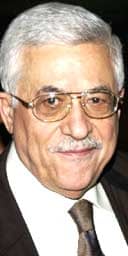After just four months in the job, the Palestinian prime minister, Mahmoud Abbas, had had enough of the constant wrangling with Yasser Arafat.
Every step of the way, the two had argued over the division of authority, particularly over who should control the security forces, a key tool in implementing a US-backed peace plan.
Mr Abbas's resignation today dealt a serious blow to peace efforts, leaving the United States and Israel without a Palestinian leader to negotiate with.
Both countries had hoped Mr Abbas, also known as Abu Mazen, would rise as an alternative to veteran leader Mr Arafat, whom they accuse of fomenting terrorism and blocking progress toward peace.
Mr Abbas, who spent decades in Mr Arafat's shadow as No 2 in the Palestine Liberation Organisation, was an outspoken critic of the three-year armed Palestinian uprising. His resignation removes from the scene of the main Palestinian voice supporting the "road map" peace plan and opposing the use of terrorism.
The result could badly derail the Middle East peace strategy of US President George Bush, who hosted Mr Abbas at the White House in July but has avoided contact with Mr Arafat. It could also end hopes of establishing a Palestinian state along provisional borders by as early as next year, as called for by the road map, and bring on a further descent into deadly violence.
Since his confirmation by parliament on April 29, Mr Abbas has struggled with a monumental task that some said was out of sync with his low-key personality and reputation for walking away from political confrontations.
His balancing act included dealing with Israeli demands that he crack down on militants without triggering civil war, easing powers away from Mr Arafat without being accused of betraying a national symbol, and re-establishing trust with Israel after three years of violence.
Mr Abbas has had a stormy relationship with Mr Arafat over the years, and there have been long periods in which the two men refused to speak to each other.
A devout Muslim, Mr Abbas was born in 1935 in Safed, a hilltop town in what is now northern Israel. Along with about 700,000 other Palestinians, Mr Abbas and his family became refugees, fleeing to Syria during the 1948-49 war that created the Jewish state.
After helping found Fatah in 1965, Mr Abbas managed finances for the movement, which became the core of the PLO. He distanced himself from the group's terror activities and remained in Syria when the PLO moved its base to Lebanon in the 1970s.
He became one of the first senior PLO officials to recognise Israel and led Palestinian negotiators in peace talks in the 1990s. He returned to the Palestinian territories in 1995 after the first Israel-PLO interim peace deals, and was made secretary general of the PLO's executive committee in 1996.
In 1995 he held talks with Israeli official Yossi Beilin that yielded a plan for a final peace settlement in which a Palestinian state would be established on almost all of the West Bank and Gaza, with power-sharing arrangements in Jerusalem.
Widely known as the "Beilin-Abu Mazen plan," it provided something of a blueprint for subsequent peace efforts - but unlike Mr Beilin, the cautious Mr Abbas has tended to avoid any discussion of the effort.
Because of this guarded nature Mr Abbas caused particular surprise when, in a meeting with Fatah officials last year, he said the uprising that erupted in September 2000 should not have been allowed to become an armed conflict and had destroyed much of what the Palestinians had built.
And in his short term in power, Mr Abbas said many of the things Israel and the United States wanted to hear, decisively condemning terrorism and recognising Israel's right to exist.
But although Mr Abbas is perceived as a moderate, in recent years he has also been a leading proponent of the Palestinian insistence on a "right of return" for refugees and their descendants to Israel - a demand that helped scuttle peace efforts and is seen by the vast majority of Israelis as a non-starter.
As prime minister, Mr Abbas found himself trapped between stronger forces: Israel demanded a crackdown on militant groups, and when Mr Abbas failed to deliver it resumed its own military strikes. The more popular Mr Arafat refused to give him full control over the armed forces or the unequivocal political backing essential in such a delicate and explosive situation.
Several years ago Mr Abbas was diagnosed with prostate cancer. He underwent surgery in the United States, and aides say he is healthy. He is married and has two sons; one owns an advertising agency and the other a construction company.
